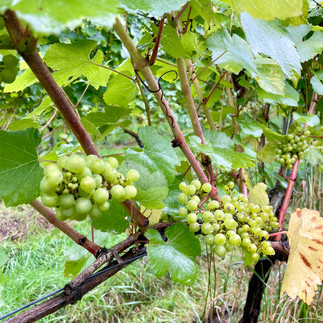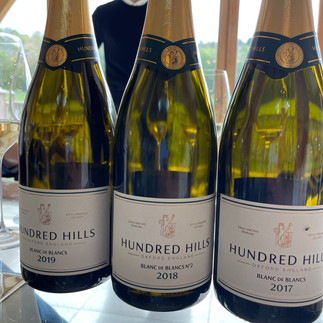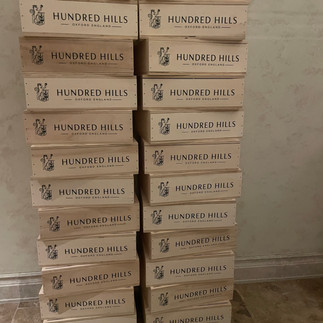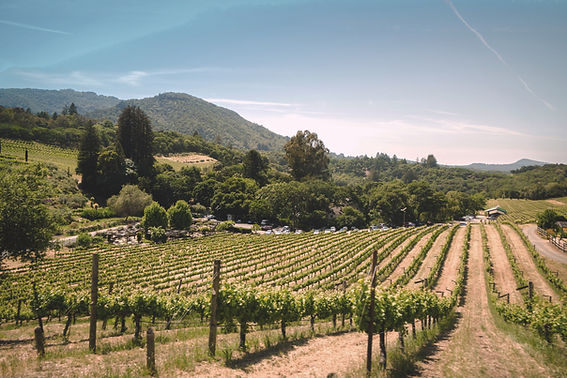Data-Driven Decadence: English Sparkling Wine at Hundred Hills
- Victoria Daskal

- Oct 30, 2024
- 6 min read
Updated: Oct 31, 2024

On a rainy mid-September day, I guided a group of wine lovers from London to the Hundred Hills vineyard in Oxfordshire. We had envisioned an Indian Summer day—sunlit vineyard strolls, sampling Hundred Hills’ prized wines under a warm September sky. Meanwhile, growers across the UK were hoping for sun to ripen their grapes fully in what has turned out to be one of the coolest, wettest seasons in years. Yet, far from dampening our experience, the rain added an unexpected charm, allowing us to dive deeper into the winery's science and tasting room, with its stunning panoramic view of the pristine vines.
Hundred Hills, founded by Stephen and Fiona Duckett, has quickly emerged as a standout among England’s elite wine producers, drawing the attention of sommeliers and critics alike. Stephen’s background in tech and Fiona’s expertise in linguistics, paired with their shared passion for wine and global travel (including significant time in California), inspired their dream to create world-class English sparkling wine.
Precision Viticulture for English Sparkling Wine
Applying their rigorous scientific background they reviewed over 300 potential sites, and then took soil analysis from a streamlined 100 sites before they invested in vineyard land. The winning combination was Hundred Hills in Oxford. The land was never farmed – for the soil was too poor- nor used for animal grazing – too steep, a perfect combination for grape growing. Indeed the landscape is gentle rolling hills that offer great drainage and south facing aspects towards the sun. They use a range of treatments on the grapes to combat mildew, including Sicilian orange oil, and Eucalyptus oil spray which are natural anti-fungal treatments.
With 17 hectares divided into 10 Chardonnay and Pinot Noir parcels, they have meticulously selected clones suited to specific soil types and vineyard slopes. Planting was handled by an expert husband and wife team from Poland that specialise in planting slopes by hand, then the renowned Simonit & Sirch were brought in to train their vineyard crew on advanced pruning techniques. The first harvest was in 2016, which also was the year their state-of-the-art winery was completed.
Traditional Method Meets Next Level Winemaking
The set up is extremely high tech. Yes you’ll find rows of shiny temperature controlled stainless steel tanks, and pristine oak vats, enough to vinify each parcel separately, but even specialised kit like a yeast propagator ensuring the fermentation gets off to a strong start. Nothing is left to chance at Hundred Hills, with all processes in house. They aim to let the grapes hang on the vine as long as possible for maximum ripeness, everything is hand harvested by around 40 pickers, and sometimes they make multiple passes through the vineyards, vinified separately and indicated on the bottles by 'No2' or even 'No3' signifying a particularly late harvest.
Downstairs, we stepped into the bottle-aging cellar, admiring the beautifully stacked magnums lining both walls. This tidy setup was inspired by a reconnaissance trip to Champagne, where Hundred Hills observed the precise stacking methods using wooden slats between rows. This dedication to detail, precision, and high standards seems to define the estate, where there’s an unwavering commitment to improvement. They are as eager to learn from industry experts as they are driven to push the boundaries of vineyard management. In partnership with Deep Planet Artificial Intelligence, they use a low-orbit satellite to monitor soil, nutrients, and vine health, gathering data that aims to guide more sustainable and efficient vineyard practices not only for Hundred Hills but also for wineries worldwide interested in advancing with this research.
Finally, we sat down for a mini-vertical tasting of Blanc de Blancs wines, marveling at the layers of complexity, age-worthiness, and terroir distinction. Following lunch, we compared sparkling rosés, each wine revealing the fruits of Hundred Hills’ data-driven, artisanal approach. It was one of those rare days where expertise, hospitality, and flavour aligned perfectly.
Wine Tasting Notes
1) Hundred Hills, Blanc de Blancs 2017
The steep slopes helped these vines escape the April spring frosts and enjoy a strong flowering and excellent ripening season. Using grapes with over 100 days on the vine, the base wines were created without a malolactic fermentation to preserve their acidity, aged for 6 months in traditional oak casks and then a further 30 months on lees. Dosage: 6g/L
Medium gold hue with fine persistent bubbles. Toasty, lemon meringue pie and brioche layers on the nose. Fabulous palate of marzipan and brioche flavours, soft mousse texture pierced with a yuzu freshness. Superb long finish.
2) Hundred Hills, Blanc de Blancs 2018 No 2
An early budburst, peak flowering on 20th June, and an excellent ripening season combined to yield a perfect harvest on 4th October. Using these grapes with over 100 days on the vine, the base wines were created without a malolactic fermentation to preserve their acidity, fermented in traditional oak casks, and then kept for 48 months on lees. Dosage: 5g/L
Zesty lemon peel and ripe pear aromas, exotic mandarin too. Quite a fresh sensation of sorbet on the palate – yellow cherries and citrus, followed by a leesy, savoury finish.
3) Hundred Hills, Blanc de Blancs 2019
An early budburst followed by a long, cool and dry season combined to yield a perfect harvest late in October. The wines underwent alcoholic fermentation and a full malolactic fermentation in traditional oak cask, and then were kept for 36 months on lees. Dosage: 6g/L
The current release from HH, youthful nose of lime peel, brioche and sweet cream. The palate is exuberant and crisp. Extremely tasty now, but worth hanging on to for those savoury notes to develop.
4) Hundred Hills, Hill Side No3 2019
A rare, very late harvested selection of our Pinot Noirs and Chardonnays from right across our south-facing vineyard parcels. Co-fermentation of 75% Chardonnay and 25% Pinot Noir followed by full malolactic fermentation, fermented and aged in traditional oak casks and stainless steel, and then kept for 42 months on lees. Dosage: 5g/L
Incredible depth on the nose, a plunge into vinous orchard and citrus notes, then brioche and pastry. Toasty and rounded mouthfeel with a bright freshness and long finish. Exceptional range of flavours, and would love to see it age further in bottle.
5) Hundred Hills, Signature Rosé 2018
Grapes with over 100 days on the vine were gently bunch pressed, base wines created without a malolactic fermentation and softened in traditional oak casks, then aged for 24 months on lees to yield a beautiful array of floral aromas and summer fruit flavours. 80% Pinot Noir (7.5% is a still wine to give colour), 20% Chardonnay.
Beautiful nose of wild strawberry, hibiscus tea, and croissant. Lovely breadth on the palate, brut with soft texture and crisp long finish. Extremely gastronomic – couldn’t resist buying a magnum of this for Christmas!
6) Hundred Hills, Rosé de Saignée 2018
From high up in the stunning Stonor Valley, this single parcel ‘bled’ rosé showcases their most delicate Pinot Noir from the exceptional 2018 vintage using an old fashioned and now rare approach to rosé making. 600 bottles produced. Dosage: 6g/L
Dark cherry juice hue, and indeed a morello cherry quality on the nose. Super vibrant palate, crushed berries, almost a Beaujolais quality to the wine, brimming with fruit. Distinctive, morish, very special, and sadly sold out.
2021 Rosé de Saignée is now on release.
7) Hundred Hills, Zero Dosage 2018
A beautiful ‘first-pass’ selection of only the very ripest grapes from our first to ripen Pinot Noir and Chardonnays. With 40 months on the lees, fermentation in wood, and a partial-malo this is a unique sparkling finished in zero dosage form.
Sensational, focused and savoury wine that offers freshness and palate cleansing acidity. Would be brilliant with sashimi, oysters.. or on the otherhand maybe a creamy Chaource to cut through the richness. Very gastronomic and serious!
8) Hundred Hills, Illustration No 1 2018
Same grapes, parcels, and winemaking of the Zero Dosage 2018, but the Illustration No1 has 4g/L Dosage. What an interesting comparison of what a touch of sweetness can do! A slightly rounded style with pops of pear tart, lemon curd and toast on the palate. Impressive concentration, then a long feather-light finish.
Overall an incredible day at Hundred Hills, and a privilege to visit given they are not open to the public. However they do have a special membership program called Friends of Hundred Hills which includes tasting experiences on select dates during the year, exclusive wine deliveries, discounts and limited release offers.



























Comments